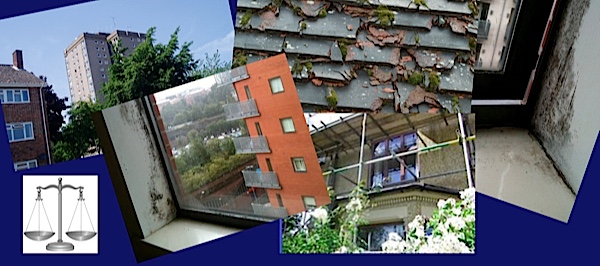 If you rent a property from the Council or Housing Association you are lucky as they are a dwindling phenomenon. However, let’s face it, they are not all in good nick. In fact some are in a disgusting condition.
If you rent a property from the Council or Housing Association you are lucky as they are a dwindling phenomenon. However, let’s face it, they are not all in good nick. In fact some are in a disgusting condition.
Even though the rent may be reasonable and you have security of tenure – you still don’t want to be freezing cold in winter due to the broken heating or have your children ill with allergies or asthma because of damp and mould.
If your home is in poor repair – your legal rights
If you are living in a substandard property there is a good chance that you have a claim against your landlord. Under s11 of the Landlord & Tenant Act 1985, your landlord is responsible for keeping in repair:
- The structure and exterior of your property (which includes the roof, walls, windows and doors
- The installations for the supply of water, gas and electricty for sanitation, and
- The installations for space and water heating
So, for example, you will have a claim if the following need repair:
- The gas boiler
- The tiles on the roof
- The window cills
- The steps outside leading up to your front door
- The staircase and bannisters
- The electrical wiring
- etc
Unless they need repair because you broke them!
Damp and mould are the big problems, but they are often tricky to claim for as sometimes they will be down to the design of the property or even down to how you are using it.
However if you have a severe damp and mould problem in your home it is always worth taking advice. There is usually something that can be done. For example, it may be possible to bring a prosecution against your landlord under the Environmental Health legislation.
What are you entitled to?
You are entitled to go to Court and claim (if you have a case) for:
- Compensation for items damaged – eg furniture or clothes damaged or destroyed by damp or mould (assuming you can prove the damp / mould is their liability)
- Compensation for personal injury if you have become ill due to the poor condition of your property – for example if you slipped and fell down a broken staircase or if your children have got asthma due to the mould
- A order that your landlord do repair work to bring the property up to standard, and
- A ‘general’ award for compensation due to the stress and not being able to use your property properly
Depending on how serious the problem is, and how long it has been going on for, you can often get a decent compensation award. In most cases you will be able to bring a claim at no cost to you under a no win no fee agreement with a solicitor.
What about private tenants?
This article specifies Council and Housing Association tenants. This is because it is much easier to bring a claim against the Council or a Housing Association. Solicitors are generally unwilling to bring a claim against private landlords as it is still (until the Deregulation Act changes kick in) possible for landlords to respond by evicting you under section 21.
There is also a strong possibility that the landlord might be unable to pay the award – and solicitors are (not surprisingly) unwilling to run what could be a complex and expensive case if there is no prospect of their getting paid.
However they may be willing to chance it if you have long term security of tenure and your landlord carries insurance. Otherwise, sadly and unfairly, you will struggle to find anyone willing to act for you unless you pay upfront for your legal fees.
So if you are a private tenant
- wait until you have signed a new tenancy or renewal (it must be after 1 October 2015), then
- make a complaint to your landlord about the problem in writing and then
- speak to your Local Authority Environmental Health service and get them out to do an inspection.
If they serve an improvement notice on your landlord, he won’t be able to serve a valid section 21 notice on you for six months.
“I think I have a claim – what should I do now?”
Go to this website and fill in the online form you will find there. Someone will be in touch with you within a few days to discuss your case with you. If it has a good chance of success you will be referred to solicitors.
Its worth a try!
